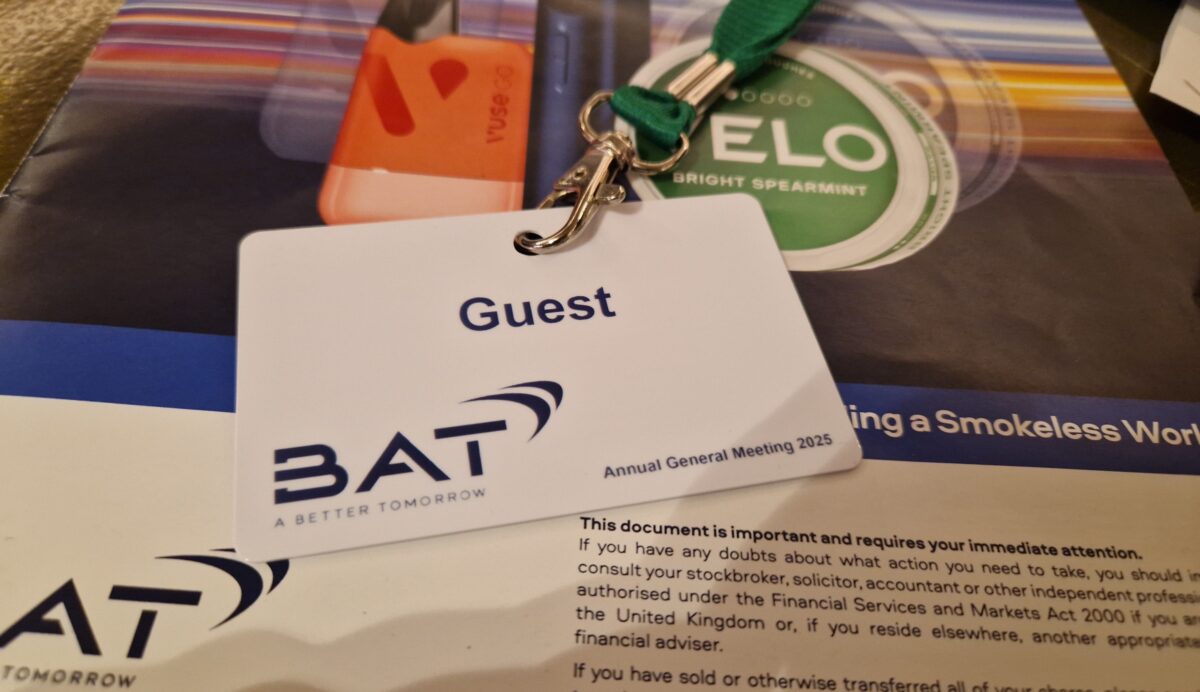Written by Phil Chamberlain of the Tobacco Control Research Group at the University of Bath
It is all about the words.
British American Tobacco’s (BAT) Annual General Meeting (AGM) was a slick affair in the basement of a central London hotel where Chair Luc Jobin outlined its 2024 activities and its plans for 2025.
There were around 100 people in the auditorium including BAT staff, private shareholders and proxies, portfolio managers and corporate guests. Of course the majority of shares are owned by investment vehicles such as pension funds.
Taking up three seats near the front and right in Jobin’s eyeline were representatives from the Tobacco Control Research Group (TCRG) and Action on Smoking and Health (ASH). TCRG had been given a proxy share and so were allowed to attend and ask questions.
Firstly though was Jobin’s address which was proceeded with a warning that no recording or pictures should be taken.
It was interesting to note what was in the 1,853 words of the address – and what was not.
Among the top words and phrases were “tobacco harm reduction” (eight mentions), “progressive” as in legislation which BAT likes (four mentions), “growth” (four mentions) and “strategic” (five mentions). There were no mentions of cancer, addiction, death, bribery, lobbying or smuggling.
What did top the charts was “new categories” as in new products (four mentions) and “smokeless” with 12 mentions.
As chief executive Tadeu Marroco admitted to a question asked by ASH, more than 95% of BAT’s profits come from combustibles. That is cigarettes.
Yet combustibles and cigarettes each only got one mention in the Chair’s address. Smokeless and new categories, these catch-all term for products such as its nicotine pouches, were given the star treatment.
In the printed copy of Jobin’s address handed out afterwards there were an additional 1,007 words of legal notes and definitions.
This started by saying: “Smokeless products/alternatives refers to smokeless tobacco and nicotine products, including Vapour products, Heated Products and Modern Oral products, which are collectively termed New Categories, as well as Traditional Oral products.”
In the questions that followed one word kept jumping out – “dialogue”.
BAT are keen to speak with regulators. They are keen to speak with the public health authorities. We sensed there was a tone of regret in Jobin’s voice as he said that some countries had brought in laws offering “solutions which look great on the surface” but in reality had a very different effect. Australia was singled out here. Instead it was, that phrase again, “progressive regulation” and also “smart regulation” that was needed.
And when asked why BAT has not complied with laws on putting graphic health warnings on its nicotine pouches in Kenya it was because laws had not kept pace with these “new categories”. That is why “dialogue” was needed, so “smart regulation” could be brought in.
Last year BAT launched Omni, a marketing effort to sell its smokeless products narrative. As part of that it set up a Tobacco Harm Reduction Advisory Group so it could hear a “diverse” set of voices. One of those was ex UK government minister Penny Mordaunt, paid an unknown amount to contribute towards this “dialogue”.
One shareholder told the meeting he was pleased to hear of this appointment and recalled another ex-government minister Ken Clarke who was on the BAT board and proudly pictured puffing on a cigar. Perhaps we might see Mordaunt similarly pictured, he inquired.
However, that did not seem to be the dialogue the board wanted to engage in, instead it was back to talk of the “new categories”, “smokeless” and “dialogues”.



